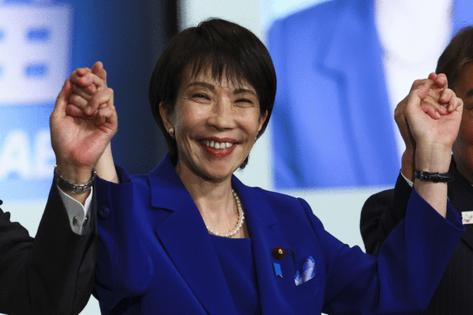Japan's Ishin to decide today on coalition with Takaichi's LDP
Published in News & Features
Lawmakers in the Japan Innovation Party (Ishin) are set to meet this afternoon to decide whether to form an alliance with the ruling Liberal Democratic Party that would likely lead to Sanae Takaichi becoming the country’s first female prime minister.
A gathering of Ishin lawmakers from both houses of parliament that begins at 2 p.m. in Tokyo may be followed by a meeting between Takaichi and Ishin leaders in the evening to confirm the alliance before a vote in parliament tomorrow to elect a prime minister, national broadcaster NHK reported.
Combined, the two parties hold 231 seats in the lower house of parliament — still two seats shy of a majority — but divisions between opposition parties mean Takaichi would be all but certain to win the vote.
Talks between the LDP and Osaka-based Ishin intensified in recent days. Ishin, which is the third-largest party in the lower house, has sought an agreement from the LDP on a temporary reduction of the sales tax on food, stricter rules on political funding and a reduction in the number of parliamentary lawmakers. Ishin’s other policy objectives include reforming Japan’s social welfare system to lower the burden on working-age people.
“I feel that we’ve built a deep level of trust, and I can face tomorrow (Monday) with confidence,” Ishin’s co-leader Fumitake Fujita said on Sunday. “I believe both I and the other party feel this way.”
It’s not clear whether the two parties will declare their arrangement a coalition. Among the options Ishin is considering is extra-cabinet cooperation — an arrangement in which an opposition party backs a minority government without joining the cabinet or creating a formal coalition, Kyodo news agency reported on Sunday.
A new coalition would give the LDP a more closely aligned partner on many policies than it had with its former ally, the centrist Komeito party, which surprised many by leaving the governing coalition earlier this month, citing differences with the party. Since then, she has scrambled to find alternative sources of support, which became more essential after the LDP lost seats in a lower house election last year and an upper house election this year.
While Takaichi is a staunch conservative on social issues, including opposition to allowing women to become emperor, her views on the economy are similar to those of former Prime Minister Shinzo Abe’s platform known as “Abenomics.” She has long advocated for government spending to boost Japan’s economic growth rate and criticized the BOJ for tightening policy.
During her campaign for the LDP leadership she took a more moderate stance, saying she doesn’t dispute the need for fiscal consolidation and would leave the specifics of monetary policy to the BOJ, but the yen has weakened and stocks have gained since her victory due to expectations of pump-priming and pressure on the central bank.
The slide in the yen would likely exacerbate inflation, a top concern among voters, creating a dilemma for Takaichi if she intends to reprise a policy course that’s in line with Abenomics.
On issues such as security, foreign policy, and energy, the LDP and Ishin are largely aligned. Both support Japan’s security alliance with the U.S. and want Japan to have a strong military, as well as better economic security, including supply chains that aren’t vulnerable to geopolitical risks. The parties are also in favor of bringing back more nuclear power into the nation’s energy mix after most nuclear plants were closed following the 2011 meltdown and radiation leak at the Fukushima Daiichi plant.
Both the LDP and Ishin want more controls on foreign investment in Japan and the fast-growing foreign tourist presence, which became hot button issues during the upper house election this year and contributed to the rise of the populist right-wing Sanseito party.
However, there’s no guarantee that a new coalition would be stable. Some Ishin lawmakers have expressed concern about the party’s ability to pursue its reform agenda with the long-dominant LDP. They would also need support from other parties to pass key legislation such as the national budget, which could create tension over policy compromises.
And unlike Komeito, which contributed to the coalition with a large population of supporters around the country who would also vote for the LDP, Ishin has struggled to find support outside of the region around Osaka, known as Kansai. A change in the coalition could weigh on votes for the LDP in future national elections and potentially create friction between Ishin and the LDP on how to coordinate candidates in Kansai.
____
(With assistance from Akemi Terukina.)
©2025 Bloomberg L.P. Visit bloomberg.com. Distributed by Tribune Content Agency, LLC.







Comments